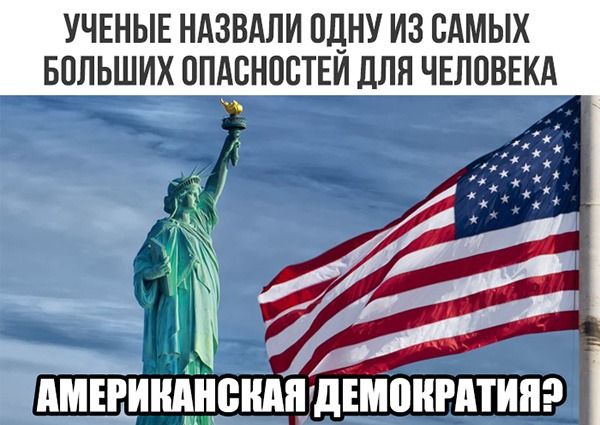Putin’s renewal of Russian power: Real, or a “ghost empire”?
By Dan Drollette Jr | March 27, 2019
 “Scientists have named one of the biggest threats to humanity: AMERICAN DEMOCRACY.” Image from Russian-language website вштабе.рф. Translation courtesy PRI.
“Scientists have named one of the biggest threats to humanity: AMERICAN DEMOCRACY.” Image from Russian-language website вштабе.рф. Translation courtesy PRI.
Russia—or at least the Russia of Putin, the oligarchs, and the latest incarnation of the KGB—seems to be on a roll lately: meddling in the US election and other democracies, taking Crimea and its Black Sea ports, destabilizing Ukraine, and seeing potential cracks form in NATO.
Putin seems to have played a bad hand very well, given the cards he was dealt.
But is that really the case?
A recent Public Radio International (PRI) series, sponsored by the Carnegie Corporation of New York, has been looking into the rise of Putin’s Russia, and asks: “Are its successes genuine, or merely sleights of hand?”
Aptly titled Ghost Empire, the series finds the greatness of Putin’s Russia is both real and imagined. It looks at the mechanics of how Russia has been projecting its power around the world lately, including the use of such unconventional warfare activities as cyber-attacks on electrical, banking, and other infrastructure; shadow armies (also known as “little green men”); Kremlin-contracted troll farms; on-line propaganda machines; and extensive forays into the bottom-feeder world of paid seeders, twitterati, trolls, and “demotivators” —Russian internet picture memes, which can be thought of as propaganda in picture form. In many ways, it seems that the concept of “hybrid war” as first articulated in 2005 by former US Defense Secretary James Mattis has come to full life, much like Dr. Victor Frankenstein’s monster. (For more analyses of this strategic concept on multiple levels, see the Bulletin’s September 2017 in-depth special issue, “The evolving threat of hybrid war.”)
The PRI series also touches on Putin’s Cold War mentality, which complements a 2016 Bulletin profile of Russian President Vladimir Putin written by Fiona Hill (then of the Brookings Institution and now on the US National Security Council) titled Putin: The one-man show the West doesn’t understand.
Publication Name: Public Radio International
To read what we're reading, click here
Together, we make the world safer.
The Bulletin elevates expert voices above the noise. But as an independent nonprofit organization, our operations depend on the support of readers like you. Help us continue to deliver quality journalism that holds leaders accountable. Your support of our work at any level is important. In return, we promise our coverage will be understandable, influential, vigilant, solution-oriented, and fair-minded. Together we can make a difference.
Keywords: Cold War 2.0, Putin, hybrid warfare
Topics: Disruptive Technologies, What We’re Reading
















Looking at the country’s new military and nuclear forces, which are deploying new weapons at rates not seen since Soviet times, I would have to say “real”.